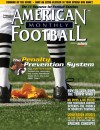Longhorn Legend
©
More from this issue
Texas strength and conditioning coach Jeff “Mad Dog” Madden oversees a cutting-edge Longhorn program that combines intense training with sound nutrition practices.
The words on the wall of the University of Texas’ strength and conditioning training facility have inspired All-Americans, Heisman Trophy winners, National Champions and hundreds of Longhorn football athletes. They read, “The pride and winning tradition of the Texas Longhorns will not be entrusted to the weak nor the timid.” It’s Jeff Madden’s job to see that these words are enforced.
Madden, who is in his 12th year as UT’s Assistant Athletics Director for Strength and Conditioning, makes sure that no Longhorn football player who sets foot on the field of Darrell K. Royal-Texas Memorial Stadium is timid and certainly not weak. Through a combination of proven training methods developed over his 25+ years as one of the leading strength coaches in America plus the very latest nutritional programs and products, “Mad Dog” Madden oversees one of the nation’s premier collegiate programs with hard work, dedication and toughness – just what he expect of his athletes.
From his playing days as a star linebacker at Vanderbilt, to his 602-pound bench press to his status as one of the nation’s leading authorities on physical development, Jeff Madden is a legendary figure.
The 2005 Samson Strength and Conditioning Collegiate Coach of the Year, Madden understands the critical role that nutrition plays in supplementing the hard work that happens in the weight room. AFM recently asked him to give us insight into his program at Texas and address a topic of increasing importance to coaches, nutritionists and athletes – proper post-workout nutritional management.
Madden: Can you sum up your philosophy for a successful football strength and conditioning program?
AFM: Our goal is to produce competitive, healthy, well-trained, hard-working, disciplined, explosive athletes with great speed and toughness that are in great shape. Our athletes want to work to win football games.
What did winning the 2005 BCS National Championship mean to you personally in terms of your strength, conditioning and nutrition program at Texas?
This was my third time in the National Championship game with two wins. It shows how we are consistently on the right track and our strength staff, along with the football staff and support staff, is putting the best product we can on the field of play. We are always trying to be on the cutting edge of successful, healthy, well-conditioned athletes. It was a great showing for the Texas Longhorn Nation.
Since your playing days at Vanderbilt 27 years ago, what are the most significant changes you’ve seen in strength and conditioning training and athlete nutrition?
There are multiple training philosophies in strength and conditioning. Changes in science and information are readily available for strength coaches and sports nutrition. The training table and athletes’ diet is much more geared for high performance.
How has your understanding of how nutrition can help athletes recover from workouts changed over the years?
The fact that we have sports nutritionists now is a great advantage for all of our athletic programs. Nutritional timing books, science, testing and research have helped immensely.
What is your post-workout nutritional strategy for your football athletes?
Some form of protein and a recovery shake within 30 minutes of exercise, which is usually a Muscle Milk Collegiate and protein bar. These help us to promote exercise recovery and lean muscle growth.
What role do Muscle Milk Collegiate products play in your program?
We use Muscle Milk Collegiate products before, during and after workouts, as supplementation in addition to meals. We use them pre- and post-game. And we also use the products for weight control and extra protein for those that need extra calories for lean muscle mass gain.
Do you use different products (e.g., powders, bars, RTD’s) for different types of athletes?
We have to find what is most palatable for our athletes. Some have food allergies or are lactose intolerant. We have a variety of NCAA compliant products for them to choose from. Some enjoy RTD’s, which are very convenient, and others want to create their own smoothies with the powders.
How would you compare Muscle Milk Collegiate products to others on the market? Muscle Milk does a great job and our athletes enjoy the taste. They are very receptive to the needs of the collegiate strength professionals.
For more information -
www.cytosport.com





